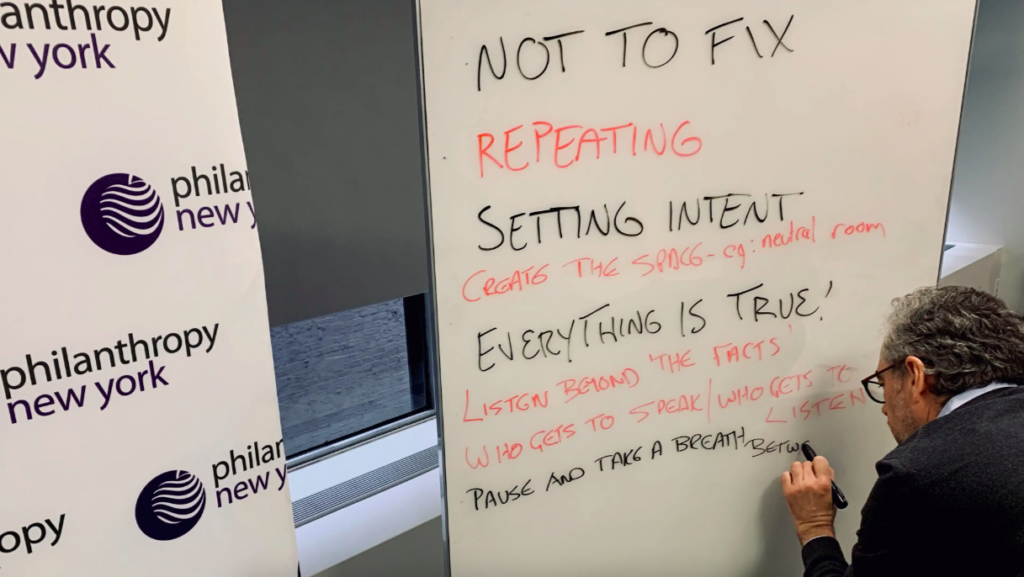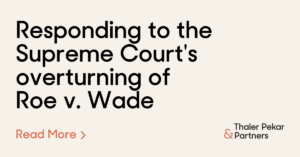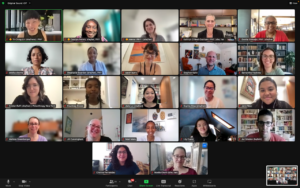2 min read
Beyond Understanding: Listening for Emergence

Pictured: Brett Davidson taking notes at our Philanthropy New York program on Listening.
This piece was originally published in 2019 on Medium.
Over the course of a week, how many minutes of high-quality listening do you receive?
How often do you get to listen to understand perspective (not for interpretation or analysis)?
What stands in the way of your listening?
These are the questions Brett Davidson and I asked during “Beyond Understanding: Listening for Emergence.” We designed this interactive program for communicators, advocates, and leaders in philanthropy. (Although not to be ignored, we were not focused on “listening across the divide”, but rather on emergent listening for leadership.)
We unpacked the power dynamics inherent in any deep exploration of listening:
Who gets to listen?
Who gets listened to?
Who goes unheard?
How do we create a space where people who are often silenced are instead heard?
And we explored how to listen to what is entirely new, or what previously held no interest.
Crucially, Brett (who is Director of Media and Narratives at the Open Society Public Health Program) voiced the fear that for leaders in philanthropy, the pressing question is, “Are people saying what they really think, or what they think I want to hear?”
How then, do we signal that we are willing to listen to what grantees and staff members want and need to say? And how can we make sure people know they are being heard?
The seemingly simple answer, to just shut up and really listen, isn’t, in practice, that simple. Too many things get in the way, including physical, mental, emotional, environmental, and technical barriers. Have you ever faltered in making eye contact, checked your messages, interrupted, or hurried the speaker to whom you were listening?
One participant added, “I’m trying to listen, but I’m still hearing things from 6 months ago.”
I told the story of how, several years ago, during my orientation to the board of a national nonprofit organization, I was asked to speak about my journey to becoming a board member. Immediately upon concluding my story, the president implored, “And you’re married, right?” I had always found this jarring: it seemed she was listening for specific information, and ignoring — even discounting — my passionate remarks. I felt unheard. A “Beyond Understanding: Listening for Emergence” participant wisely noted that perhaps I was indeed fully heard, and that the president was actually seeking to build upon and better understand my story.
And another participant sagely noted that “everyone’s bar for whether or not they’ve been heard is different.”
Together, we explored the importance of a non-assuming, beginner’s mind. We attempted to hear everything as new, and to honor the uniqueness of the other person’s perspective.
We played games that asked us to cede control and anticipation.
There are no easy fixes. Listening is a skill, requiring constant practice. Another participant recently wrote, “I was surprised (and shouldn’t have been) to find so many opportunities to think back to it in the following weeks.” For one grey Friday morning, we all got to practice. We all got to be heard. And we all heard so much!
Thaler Pekar & Partners is internationally-recognized for its deep expertise in narrative, story, and communication. Both the BBC and the Smithsonian Institution have hailed the founder, Thaler Pekar, as one of the world’s leading experts on institutional storytelling.
For 14 years, the team at Thaler Pekar & Partners has advised visionaries on being understood and influential. Our trademarked communication processes — Heart, Head, & Hand®, Engagement Equation® and Invitational Incline® — provide leaders with the confidence to speak, listen, and be heard, and sustain them in offering effective motivation. As a result, teams are more productive, audiences are more receptive, and visibility increases.
Our award-winning work ranges from gathering 178 oral histories across four continents and six countries for Chuck Feeney’s The Atlantic Philanthropies; to finding and refining stories about integrity for Novartis senior leadership; to coaching a mainstage TED Talker; and to developing a communication and story skills academy for L’Oreál International Educators and Customer Representatives.







